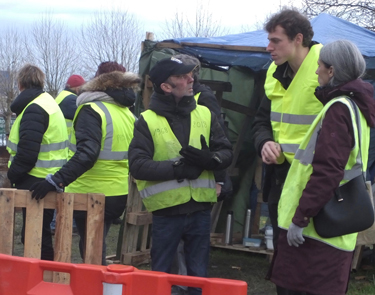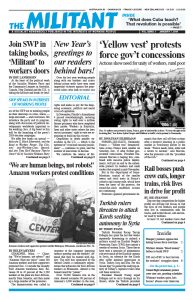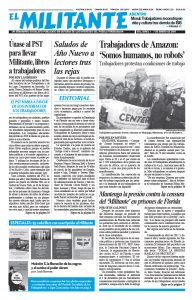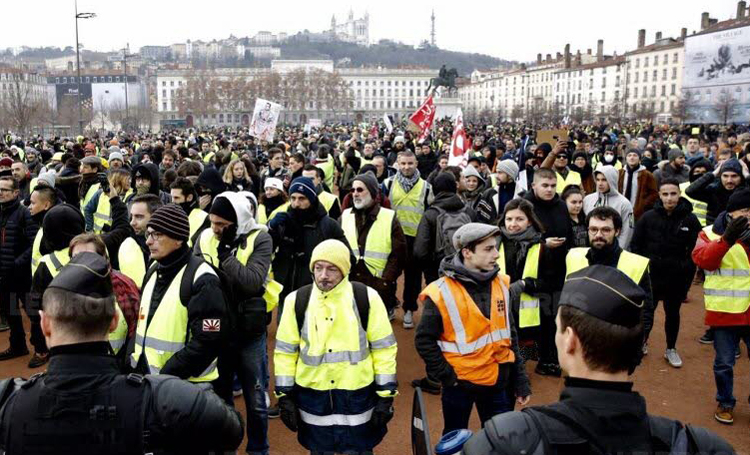FORGES-LES-EAUX, Normandy, France — “Yellow vest” demonstrations across France were smaller on Saturday, Dec. 15 after further government concessions. President Emmanuel Macron is hoping this, combined with massive police deployments, will put an end to the nationwide protests by workers and small traders that erupted in mid-November.
But in this department of Seine-Maritime, typical of the smaller towns and rural areas in France’s suburbs and countryside, which have been the heart of the protests, the round-the-clock roadblock actions are continuing.
Protesters ignored government demands that they call off their actions after a terrorist shooting in a public market in Strasbourg earlier in the week. “France needs calm, order and a return to normal,” said Macron, who the protesters call the “president of the rich.”
Government spokesperson Benjamin Griveaux told protesters they should be “reasonable” and stay home, saying the cops and other security forces were under “strain” trying to deal with the protests as well as the shooting. The CFDT union federation joined in calling for the protests to end. While the government considered banning the protests, it ultimately decided not to.
Working people here have faced years of accumulated carnage imposed on them by the propertied rulers’ efforts to make them pay for the crisis of French capitalism. They’ve seen jobs, industries and government services dry up, small businesses crushed by giant retailers, while government taxes and fees pile up.
A team of Communist League members from the U.K. went to Normandy Dec. 10-11 to meet with yellow vest militants there, to express solidarity with their fight and cover the protests for the Militant.

The yellow vests get their name from the high visibility jackets the French government forces all motorists to keep in their car.
“We’re not looking for mealy-mouthed words from Macron. We want his resignation,” Nadia Lemerud told us. Lemerud and fellow school bus drivers Sylvie Leroueille and Sylvie Orquin were on a yellow vest roundabout — traffic circle — protest in this town of 4,000, surrounded by farmland.
They’ve set up a stall here, with a protest shack and highly visible signs. Cars and trucks passing by hoot their horns in support.
Born and bred in Forges, “we’ve never before been on any political protest. Even a few months ago, I never imagined we’d be doing this,” Orquin told the Militant. “But we’ll probably be spending Christmas here.”
The women were speaking the day after a televised address in which Macron announced a rise in the national minimum wage and other concessions to the protesters. A week before the government had conceded that planned fuel tax rises — which triggered the rebellion — would be cancelled.
The administration has combined these concessions with slanderous violence-baiting attacks on the yellow vests, charging them with “smashing our businesses,” “our heritage” and “our republic.”
“The minimum wage is index-linked, so there would have been a rise in January anyway,” protester Arnold told the Militant in a Dec. 16 phone interview. “And what Macron announced is not in fact a rise in the minimum wage. He’s announced that workers on the minimum wage can apply for state benefits that amount to €100 a month ($113) — but only if there’s only one wage earner in the household and only if they’re working a full 35-hour week. Moreover, the application process for such state benefits, including a working tax credit, is so intrusive that many simply don’t apply.”
After it became public that these measures would apply to just 30 percent of low-paid workers, Macron announced further concessions which the media says will boost this figure to 55 percent.
Popular support for yellow vests
Arnold, 27, was among the hundreds of thousands who joined the rebellion from its outset. He arranged for our visit to Normandy, introducing us to fellow yellow vest protesters, to small farmers, and joined us knocking on workers’ doors in the area. From these experiences it’s clear there is widespread support for the protests. And broad opposition both to the massive police use of tear gas, water cannons and other assaults against protesters, as well as to “black bloc” antifa and similar outfits that have burned cars and carried out other acts of vandalism during recent demonstrations in Paris. These actions play into the hands of the government’s violence-baiting.
In the coastal town of Dieppe yellow vests maintain round-the-clock protests at three roundabouts at the entry to retail and industrial parks. They allow cars and buses to pass, but block the key exit roads to commercial trucks and “divert” them on what for many becomes a wild goose chase. Many truck drivers support the yellow vests and are quite content to return to base having found it “impossible” to deliver their cargo.
The broad anger at Macron and his disdain for working people was palpable. Like Hillary Clinton, who dismissed workers in the U.S. who didn’t back her as “deplorables,” Macron spoke in June about so-called populists being a case of “leprosy.”
“Macron thinks those who labor are dumb,” said protester Nathalie Girard. “But the opposite is the case. The work we do — that’s intelligence, that’s creativity.”
On arrival at one Dieppe roundabout, we were greeted by van driver Claude Hermay, cook Delphine Frebourg and bricklayer Davide Leidle, along with Caroline Mason, who is unemployed. When we apologized for our poor French, they replied, “The language of solidarity is international!” These roadblock gatherings are a hive of discussion. A prominent topic is what appears to be a universal hatred of the European Union, of which Macron is a fervent supporter.
Philippe Martínez, head of the CGT, the main trade union federation, has been at pains to distance the unions from the yellow vests. While it’s good that they’ve taken up some of the unions’ demands, he says, the yellow vests include forces of the extreme right and small businesspeople who are enemies of the unions. Many yellow vests welcome participation from trade unionists, and many unionists have been won to the protests.
Like in the U.S., the percentage of workers in France who are in unions has shrunk, both because of boss attacks and the class-collaborationism of the union officialdom.
We explained that the road forward is for the working class and the unions to join the protests and reach to unite with the rural poor in a common struggle against the impositions of capitalist rule. If we don’t succeed in this, then the road is open, as conditions worsen, for pro-capitalist ultrarightist elements to try and move in.
Yellow vests we talked to were glad to discuss with us and for support from the Communist League.


